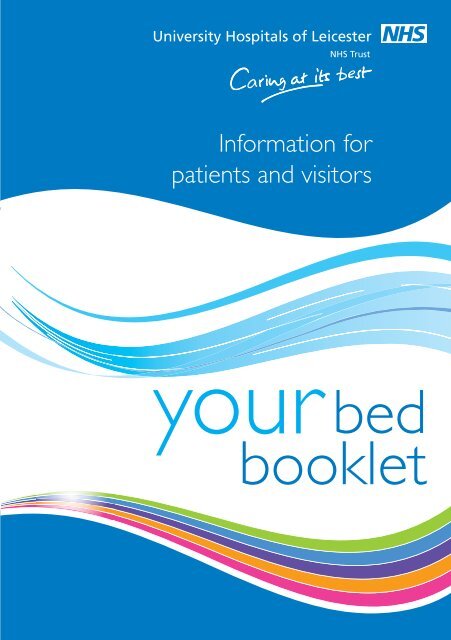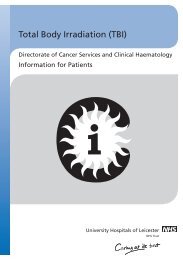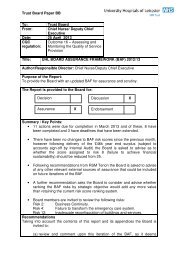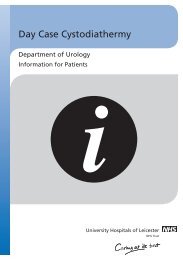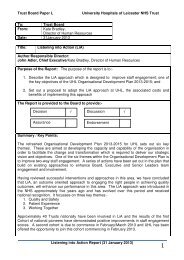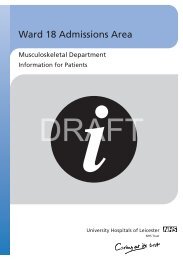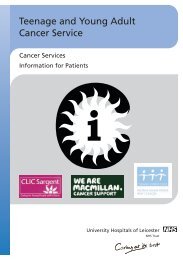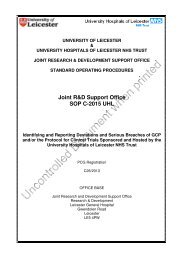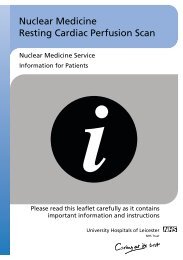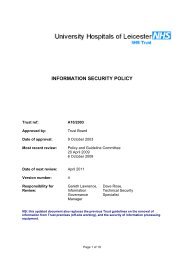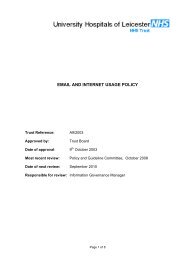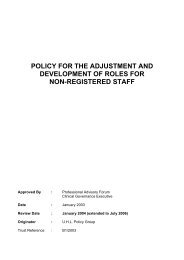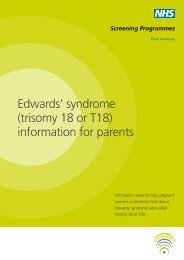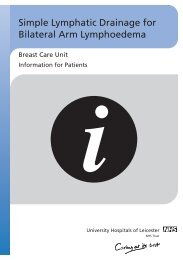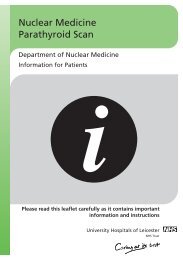Leicester General Hospital Bedside Information for Patients - Library
Leicester General Hospital Bedside Information for Patients - Library
Leicester General Hospital Bedside Information for Patients - Library
Create successful ePaper yourself
Turn your PDF publications into a flip-book with our unique Google optimized e-Paper software.
University <strong>Hospital</strong>s of <strong>Leicester</strong>NHS Trust<strong>In<strong>for</strong>mation</strong> <strong>for</strong>patients and visitorsyourbedbooklet
your bedbookletWelcome to University <strong>Hospital</strong>sof <strong>Leicester</strong> NHS TrustPart 1About your hospital sitePart 2<strong>In<strong>for</strong>mation</strong>:1. Older people’s champions2. Understanding & preventing infections3. Preventing blood clots while in hospital4. Same sex accommodation5. Stopping smoking6. Volunteers7. Chaplaincy8. Pain management9. Property disclaimer10. Tissue viability11. Ward transfers and discharge arrangements12. Patient in<strong>for</strong>mation and liaison service (PILS)13. InterpretersPart 3About your ward
University <strong>Hospital</strong>s of <strong>Leicester</strong>NHS Trustwelcome to<strong>Leicester</strong> <strong>General</strong> <strong>Hospital</strong>yourbedbookletPart 1
your bedbookletWelcome to <strong>Leicester</strong> <strong>General</strong> <strong>Hospital</strong>University <strong>Hospital</strong>s of <strong>Leicester</strong> NHS Trust (UHL)includes Glenfield <strong>Hospital</strong>, <strong>Leicester</strong> <strong>General</strong> <strong>Hospital</strong>and <strong>Leicester</strong> Royal Infirmary.University <strong>Hospital</strong>s of <strong>Leicester</strong> NHS Trust was <strong>for</strong>medin 2000 and is one of the largest and busiest teachingtrusts in England, providing services <strong>for</strong> people across<strong>Leicester</strong>, <strong>Leicester</strong>shire and Rutland.<strong>Leicester</strong> <strong>General</strong> <strong>Hospital</strong>Gwendolen Road<strong>Leicester</strong>LE5 4PWPhone: 0300 303 1573
Part 1<strong>Leicester</strong> <strong>General</strong> <strong>Hospital</strong>The <strong>General</strong> <strong>Hospital</strong> is on the outskirts of <strong>Leicester</strong> inEvington. It is about three miles east of <strong>Leicester</strong> city centreand has about 680 beds. The hospital provides a range ofmedical services including care at our national centre <strong>for</strong>renal and urology patients.RestaurantMargaret’s Restaurant is near to the main reception. It has a largeeating area inside and a seating area outside.It includes a salad bar, hot main choices including a vegetarianoption and a snack counter. Sandwiches and drinks are alwaysavailable and meals are served seven days a week.Vending machinesThere are a number of vending machines <strong>for</strong> your convenience,these can be found on the medicine corridor, on the main corridorand outside ward 26/27.your bedbooklet
Part 1WRVS shop<strong>Leicester</strong> <strong>General</strong> <strong>Hospital</strong>There is a WRVS shop on the main corridor which sells newspapers,magazines, toiletries, drinks, food and small gift items. This shop isopen seven days a week.There are also two trolleys which go to the wards. These sellnewspapers and magazines as well as sweets and toiletries.WRVS refreshmentsThere are two tea bars where you can buy beverages and lightsnacks. These are situated at the maternity reception and also in theoutpatients department.Cash machineThere is a Royal Bank of Scotland cash machine at the mainreception area.Cardholders with the following cards can use the machine:Bank of ScotlandBarclays BankHSBC BankLinkLloyds TSB BankMastercardNatwest BankRoyal Bank of Scotland.Visa
Part 1<strong>Leicester</strong> <strong>General</strong> <strong>Hospital</strong>PostPost is delivered to wards twice a day, morning and afternoon.For prompt delivery please let friends and relatives know which wardyou are on and use the following address <strong>for</strong> incoming letters:Patient NameWard Name or NumberUniversity <strong>Hospital</strong>s of <strong>Leicester</strong> NHS Trust<strong>Leicester</strong> <strong>General</strong> <strong>Hospital</strong>Gwendolen Road<strong>Leicester</strong>LE5 4PWRadio GwendolenRadio Gwendolen is run by volunteers, who prepare and presentradio broadcasts <strong>for</strong> patients at <strong>Leicester</strong> <strong>General</strong> <strong>Hospital</strong>. Thestation provides a 24 hour service of music, news and in<strong>for</strong>mation<strong>for</strong> the hospital audience.The station has a large collection of records and CDs and welcomesrequests from patients on the wards. To request a song or leave amessage, call Radio Gwendolen on 0116 258 4290You can listen to Radio Gwendolen on your bedside radio. Mostbeds have a bedside radio selector and nurse call switch. These areusually on a box linked to the bed head panel. Earphones may beconnected to this panel. Please ask <strong>for</strong> earphones if they are not inplace.Radio Gwendolen can also be heard on personal radios on 1287AMon the medium wave (MW) band.your bedbooklet
Part 1TV and telephones<strong>Leicester</strong> <strong>General</strong> <strong>Hospital</strong>Most wards have a television. Personal televisions may be allowedat the discretion of the ward sister/charge nurse but you must useearphones.Most wards have a portable payphone <strong>for</strong> outgoing calls. You willneed loose change <strong>for</strong> this. Mobile phones can be used in nonclinicalareas.Ward foodThe catering provider is ISS Mediclean who aim to ensure that allyour dietary and cultural requirements are met during your stay withus.On your ward there will be a menu folder which holds all thenecessary catering in<strong>for</strong>mation you require, from what is beingserved at each mealtime, to a wide range of differing menusavailable to everyone. There are vegetarian, healthier eating, highenergy and soft options.If you have diabetes you may wish to choose from the healthiereating options. If your appetite is reduced you may decide to choosefrom any of the menu options and discuss suitable changes to yourdiabetes medication with your doctor if necessary.Additional snacks can be provided <strong>for</strong> people with diabetes. Pleaseask a member of the ward team.Aside from the main menu of the day, we also have thefollowing:Halal menuMulticultural menu (including a wide range of vegetarian options)Afro Caribbean menuKosher menu
Part 1<strong>Leicester</strong> <strong>General</strong> <strong>Hospital</strong>In partnership with our dietitians and ISS Mediclean we haveproduced a variety of special menus <strong>for</strong> patients with specificrequirements, these include:Peanut legume and tree nut free menuGluten free menuLow residue diet menuModified textures menu (puree etc)Please be sure to in<strong>for</strong>m your ward if you are currently on any of theabove diets.If you are not available to eat at a mealtime (you may be away fromthe ward having a procedure etc), we also offer a snack box option,which is available to all our patients who missed their hot meal andconsists of a sandwich, yoghurt and a packet of crisps.If during your stay you have any questions or comments regardingfood, please feel free to ask a member of the nursing staff tocontact the catering team who will be more than happy to visit youon your ward.your bedbooklet
Part 1Car parking<strong>Leicester</strong> <strong>General</strong> <strong>Hospital</strong>There is a charge to park at all of our hospitals, including the<strong>Leicester</strong> <strong>General</strong> <strong>Hospital</strong>. A range of season tickets are available<strong>for</strong> patients and prime carers, including weekly and monthly tickets.There is a maximum daily charge <strong>for</strong> all patients. For morein<strong>for</strong>mation please ask ward staff <strong>for</strong> the car park in<strong>for</strong>mationleaflet.Please be aware that unauthorised parking may result in a parkingcharge notice of £80 with a payment period of 28 days, reduced to£50 if payment is made within 14 days.Disabled parking<strong>Patients</strong> and visitors who have blue badges can park <strong>for</strong> free as longas they display their blue badge permit at all times whilst parked.Drop-off pointsThere is a drop off point at the main entrance to the hospital.<strong>Hospital</strong> shuttle busOur hospital shuttle bus, the <strong>Hospital</strong> Hopper, runs every 30 minutesand links the Glenfield <strong>Hospital</strong>, <strong>Leicester</strong> <strong>General</strong> <strong>Hospital</strong> and<strong>Leicester</strong> Royal Infirmary with the Beaumont Leys Centre, HamiltonCentre and the railway station (with limited stops en-route).The hopper bus has a single priced ticket that allows unlimited travel<strong>for</strong> the day. All national recognised concessions are allowed on thebus.
Part 1No smoking hospitals<strong>Leicester</strong> <strong>General</strong> <strong>Hospital</strong>Smoking is not allowed in any of the hospital buildings at <strong>Leicester</strong><strong>General</strong> <strong>Hospital</strong>.If you do wish to smoke, there are a number of red smoking sheltersin the grounds of the hospital <strong>for</strong> the use of patients and visitorsonly. Please ask a member of staff where your nearest smokingshelter is.For more detailsThe opening times of a number of facilities have not been includedas they change frequently in line with customer needs. Please ask amember of the ward team if you require any further in<strong>for</strong>mation.<strong>In<strong>for</strong>mation</strong> is also available on our website www.uhl-tr.nhs.ukyour bedbooklet
University <strong>Hospital</strong>s of <strong>Leicester</strong>NHS TrustwelcomeyourbedbookletPart 2
your bedbookletWelcomeWe want you to be as com<strong>for</strong>table as possible duringyour stay and hope you will find the in<strong>for</strong>mation in thisbooklet helpful during your time in hospital. The teamin charge of your care will make every ef<strong>for</strong>t to keepyou fully in<strong>for</strong>med of your progress and ensure thatyou are ready to leave hospital as soon as possible.You may find that not all of the in<strong>for</strong>mation in thissection will be of interest to you, so just refer to theparts that you feel are relevant.
Part 21. Older people’s championsAn older people’s champion is a member of staff who hascompleted additional training which highlights the specificneeds of the older person.We have more than 1,400 older people’schampions who are working across ourhospitals looking out <strong>for</strong> the needs of olderpeople. Older people’s champions will listento concerns, questions or comments, speakout <strong>for</strong> older people and provide reassuranceand assistance. They can be identified by theiroak tree badge.Memory concerns<strong>In<strong>for</strong>mation</strong>If you are known to experience memory problems or confusion, apatient profile can be competed by you, a relative or carer, to helpstaff communicate more effectively with you during your stay inhospital. Please ask a member of staff <strong>for</strong> further details.your bedbooklet
Part 22. Understanding and preventinginfections<strong>In<strong>for</strong>mation</strong>We understand that coming into hospital can be an anxioustime <strong>for</strong> you. The worry is sometimes made worse by mediareports about so-called ‘superbugs’.It is important to understand that the risk of getting an infectionwhilst in hospital is very low.We have a team of infection prevention specialists who are dedicatedto reducing your risk of getting an infection while you are in hospital.We steam clean our wards and isolate patients when needed. Thereare a range of in<strong>for</strong>mation leaflets available including, Norovirus(diarrhoea and vomiting), MRSA, Clostridium difficile, Tuberculosis andFlu which are available on the ward.To reduce your risk you will have been prescribed an antibacterialsoap, called Stellisept wash, to use daily. This not only gets rid of thebacteria which we all have on our skin all the time but has a lastingeffect which stops the bacteria growing back as quickly as ordinarysoap. Hand sanitiser is provided in all care areas, so that health carestaff can clean their hands easily and effectively. You will see postersreminding staff of the ‘5 moments’ when hands should be cleaned.Don’t be afraid to ask staff if they have cleaned their hands.If you have any questions or concerns during your stay theinfection prevention link nurse will be happy to come and seeyou and give further advice and support. They can becontacted through the ward staff.
Part 2How to use Stellisept wash<strong>In<strong>for</strong>mation</strong>1 Always use a new disposable cloth (which wewill provide) to prevent the spread of germs.2 Apply Stellisept wash directly onto wet hairand skin or a new disposable cloth.Rub body and hair thoroughly, payingparticular attention to skin creases, underarms area and skin between fingers and toes.3 Leave on your body <strong>for</strong> at least 30 secondsand then rinse off.You may use your own shampoo andconditioner afterwards if you wish.4 Finally, dry yourself with a clean towel.Use daily on your body and twicea week on your hairyour bedbooklet
Part 2What you can do to help us fightinfections:• Use your own toiletries• Keep your hands and body clean<strong>In<strong>for</strong>mation</strong>• Wash your hands with soap and water be<strong>for</strong>e eating andafter using the toilet• If you use a commode ask <strong>for</strong> a bowl of water to wash yourhands in afterwards• If the bathroom or toilet isn’t clean, report it immediatelyto the nurse in charge of the ward and ask <strong>for</strong> it to becleaned. Use an alternative (if available) in the meantime• Keep the top of your locker and bedside table clutter free.It’s easier <strong>for</strong> us to clean• Always wear something on your feet when you get out ofbed. Slippers are fine, but make sure they have some gripon the bottom - hospital floors can be a little slipperysometimes!• Your bed-area should be cleaned regularly. If you or yourvisitors see something that has been missed, report it to thenurse-in-charge and ask <strong>for</strong> it to be cleaned.
Part 23. Preventing blood clots while you are inhospital and recovering at homeBlood needs to clot to stop an injury from bleeding. This is acomplex process. Sometimes it can go wrong and a clot will <strong>for</strong>m inthe wrong place, usually in the deep veins of the leg. This is called a‘deep vein thrombosis’ or DVT.A DVT blocks the normal flow of blood through the vein and cancause pain, redness, tenderness and swelling.Sometimes a piece of this clot can break off and travel to the lungs,blocking the flow of blood in the lung vessels. This is called a’pulmonary embolism’ or PE. PEs can cause chest pain and problemswith breathing that can be very severe.Anyone can get a DVT. It does not matter what your age is orwhether you are male or female.Some people are more at risk than others because they are:• Staying in hospital• Having surgery• Pregnant• Overweight• On certain medicationsPeople are also more at risk if they have:• A serious condition• A family history of DVTs or pulmonary embolisms• Certain inherited conditions<strong>In<strong>for</strong>mation</strong>your bedbooklet
Part 2<strong>In<strong>for</strong>mation</strong>To help prevent a clot during your stay you can:• Drink lots of water unless advised otherwise. This helps to keepyour blood flowing freely.• Keep moving your legs. This stops your blood from slowingdown and clotting.• Walk around. If you are not able to get out of bed, keep yourlegs moving. If this is difficult, exercise your ankles. The more youdo this, the better.What staff might do:Staff may not need to do anything more than encourage you to dothe things listed above. If you are more at risk – <strong>for</strong> example if youare having surgery - there are two things they may do:• They may give you some tight stockings to put on your legs.These squeeze your legs to help keep the blood moving• They may also give you some daily, small injections of a medicinecalled Heparin. This encourages the blood to flow rather thanclot.When you go homeWhen you have left hospital you are still at risk. A blood clot can still<strong>for</strong>m while you are getting better. You can make this less likely byfollowing the advice in this leaflet, drink lots of fluids (unless advisedotherwise) and keep as mobile as possible. Seek medical adviceimmediately if you are concerned about new symptoms of leg pain,leg swelling or chest pain and breathlessness.If you have any questions while you are in hospital, please ask yourward nurse. If you would like further in<strong>for</strong>mation once you gethome, visit:Lifeblood - www.thrombosis-charity.org.uk
Part 24. Same sex accommodation<strong>In<strong>for</strong>mation</strong>Every patient has the right to receive high quality care that issafe, effective and respects their privacy and dignity. We arecommitted to providing every patient with same sexaccommodation.<strong>Patients</strong> who are admitted to any of our hospitals will only share thearea where they sleep with members of the same sex. Same sextoilets and bathrooms are close to the bed area and are clearly signposted.Exceptional circumstances:Our staff will always provide access to safe acute clinical care andsaving lives will always be our priority. However, providing access tosame sex sleeping areas has become an important part of the cultureof our clinical teams.Sharing with members of the opposite sex will only happen byexception based on clinical need (<strong>for</strong> example where patients needspecialist equipment such as in intensive/coronary care units or onadmission wards), or when patients choose to share (<strong>for</strong> examplewhen having renal dialysis). Your privacy and dignity will bemaintained throughout.There will sometimes be a need to share accommodation in otherareas of our hospitals when a patient’s clinical care and treatmentbecomes more important than providing same sex accommodation.If this happens it will always be <strong>for</strong> the shortest possible time and afull explanation will be provided. We will do our best to ensure yourprivacy and dignity is maintained.your bedbooklet
Part 25. Stopping smoking<strong>In<strong>for</strong>mation</strong>During your hospital stay you will be asked about whether yousmoke. If you smoke you are more likely to suffer complicationsduring your treatment.Stopping smoking is the most effective thing you can do to helpyour recovery during your hospital stay and to reduce the risk ofadditional illness.On admission to this hospital you will be offered a referral to theNHS Stop Smoking Service. The Stop Smoking Service will supportyou with medication such as patches, gum or medication, as well asfriendly help and advice on discharge about how to break the habit.Please call the STOP team on 0116 295 4141 <strong>for</strong> more details.6. VolunteersDuring your stay in hospital you may meet some of our 1000volunteers.Our volunteers wear aqua polo shirts and ID badges with their nameand role. Volunteers are here to improve your experience by offeringextra help and support.Volunteers are available in the main reception areas to guide you orto offer you transport on our patient buggy. Some volunteers helpon the wards with drinks, meals and other tasks and some will visitpatients and run errands to the shops or restaurants <strong>for</strong> you.We have a volunteer library service, hairdressers and even a PAT Dog.All of our volunteers have completed a comprehensive registrationand training process so that they can offer you the best possibleservice.If you would like more in<strong>for</strong>mation about volunteering orwould like a volunteer to visit you or your relative please callVolunteer Services on 0116 258 3955 /7221 /8868
Part 27. The Chaplaincy<strong>In<strong>for</strong>mation</strong>The hospital chaplains are available to offer support to you and yourrelatives. Our team includes a range of faiths and outlooks includingChristian, Hindu, Humanist, Muslim and Sikh Chaplains, as well as arange of volunteers of various faiths and outlooks.You don’t have to feel you are a religious person or be a regularworshipper to make use of our services. Coming into hospital <strong>for</strong>any sort of investigation or treatment can raise all kinds of questions,anxieties and fears.Chaplains are always ready and willing to listen in confidence and tohelp you in your search to understand and make sense of what ishappening to you. We are here to help you find that sense of innerpeace which is such an important part of the healing process.Chapels and prayer roomsThere are chapels and prayer rooms at all three hospitals. They arealways open (except at the Royal where they are closed at night) andprovide a place <strong>for</strong> prayer or quiet reflection.Locations and times of prayers and services are displayed on thechaplaincy notice boards and around the wards. If you wish toattend a prayer service please in<strong>for</strong>m the nursing staff. If you needto be collected in a wheelchair please ask the staff to in<strong>for</strong>m thechaplains.your bedbooklet
Part 2<strong>In<strong>for</strong>mation</strong>Requesting a visitMembers of the chaplaincy team regularly visit the wards so doplease let us know if you would like to talk. Nursing staff will alsopass on requests <strong>for</strong> a chaplain to visit.Non-urgent and confidential messages can be left on the chaplaincyanswerphone by phoning:Glenfield <strong>Hospital</strong>: (0116) 258 3413<strong>Leicester</strong> <strong>General</strong> <strong>Hospital</strong>: (0116) 258 4243<strong>Leicester</strong> Royal Infirmary: (0116) 258 5487If you wish we can pass a message to someone of your own faith,denomination or outlook and ask them to visit you.8. Pain assessmentWhilst you are in hospital you will be asked by the nursing staff ifyou have any pain.We use a 0 - 10 pain scale.0 is no pain10 is the worst pain you can imagine.You will be asked periodically to rate your pain between these 2points.It is important that you tell us:• How bad your pain is - using the 0 -10 scale• Where your pain is• What it feels like - stabbing, shooting, burning.We will do everything we can to keep you com<strong>for</strong>table whilst youare in hospital. However it is not always possible to keep youcompletely pain free especially if you have had an operation.
Part 29. Property disclaimer<strong>In<strong>for</strong>mation</strong>We are committed to providing you with excellent healthcare.Un<strong>for</strong>tunately, whilst we are caring <strong>for</strong> you we are not able tocare <strong>for</strong> your property.The Trust will not accept liability in respect of any loss or damageto patients’ property and belongings unless they have beenhanded over to members of staff <strong>for</strong> safekeeping and a receipthas been issued to you or your relative.We strongly advise that you do not bring property into thehospital and ensure that any property brought into the hospital issent home.This disclaimer also applies to belongings required in daily life,such as, dentures, spectacles and hearing aids.your bedbooklet
Part 210. Pressure ulcers<strong>In<strong>for</strong>mation</strong>A pressure ulcer (also called bed sore or pressure sore) is an area ofyour skin which is damaged due to prolonged pressure resulting inlocal pain with or without actual skin loss.The first signs of pressure damage are local pain and a change in thecolour of the skin. Depending on the degree of skin/tissue damagethis may get progressively worse and lead to an open wound/ulcerwhich can become infected.The most common sites <strong>for</strong> pressure damage is over bony areas(where the bones are close to the skin) e.g. bottom, heels, elbows,ankles, back of the head, hips, etc.Who gets pressure sores?Anyone can get pressure sores and at any age if they become very illand cannot move properly. Un<strong>for</strong>tunately there are people whoserisks are increased considerably due to different conditions orillnesses or nutritional and mobility problems.What can be done to prevent pressure ulcers?When you are admitted nursing staff will look closely at yourpressure areas and use a risk assessment tool (called Waterlow) toidentify whether you are ‘at risk’ of developing pressure damage.This assessment is very important because it alerts us that you mayneed special equipment and increased nursing care.
Part 2<strong>In<strong>for</strong>mation</strong>To help prevent pressure ulcers, we may encourage you to:• Turn and reposition. We will encourage you to do this if you areable to do so.• You may have been asked to use special equipment such asan air mattress; cushions; leg troughs. All of our hospitalmattresses are high specification foam mattresses which providelow to moderate pressure relief.• Skin care – we will provide regular hygiene if you havecontinence problems. We may use moisturising creams toimprove skin condition, or use barrier creams to prevent skindamage.We have a specialist team providing access to expertise in promotinggood skin care and wound management, if you would like to speakwith a member of this team please ask the ward team to contactthem.your bedbooklet
Part 211. Ward transfers and dischargearrangementsDuring your stay in hospital it may be necessary to move you todifferent wards within the hospital or to other NHS care providers toensure that you receive ongoing assessment and appropriatetreatment <strong>for</strong> your needs.It is important to start planning your discharge arrangements asearly as possible, as you start to recover the team will discuss goinghome and the arrangements that might need to take place once youare ready to be discharged.As part of planning your discharge the team will carry out anassessment of your needs. This involves looking at what is best <strong>for</strong>you. The team is made up of doctors, nurses, physiotherapists,occupational therapists and social workers, who will discuss yourneeds and the options with you and, with your permission, willinvolve close relations or friends who support you at home.The assessment will consider which one of the following isbest <strong>for</strong> you.1. Discharge to your home2. Discharge home with support such as a care package by SocialServices3. Going home but with a course of rehabilitation/intermediate care(a place where you can go <strong>for</strong> a short time) be<strong>for</strong>e you go home4. Rehabilitation (ongoing care) in another hospital or in a suitableresidential home5. Discharge to a nursing/residential home.<strong>In<strong>for</strong>mation</strong>
Part 2<strong>In<strong>for</strong>mation</strong>There are lots of people available to help with your dischargepreparations and wherever possible they will assist you to returnhome.If it is agreed that you will need a 24 hour care environment ondischarge, in the short or longer term, Social Services will help youto arrange this.Due to the demand <strong>for</strong> hospital beds we may need you to move to atemporary care placement if agreed options <strong>for</strong> your future care arenot available when you are no longer in need of hospital care. Pleasebe aware that you should accept the temporary placement as youcannot continue to occupy a bed in this hospital once you are ready<strong>for</strong> discharge and a suitable place has been offered.your bedbooklet
Part 212. Patient in<strong>for</strong>mation and liaison service(PILS)Your comments and feedback about your experience with us areinvaluable and welcomed.In the first instance please talk to the nurses on the ward, the wardsister, or ask to speak to the matron. If issues remain unresolvedthen please contact us directly:Freephone: 0808 178 8337Email:In Writing:pils.complaints.compliments@uhl-tr.nhs.ukTrust HeadquartersGwendolen HouseGwendolen Road<strong>Leicester</strong>LE5 4QFFurther in<strong>for</strong>mation can be found on the trust website:<strong>In<strong>for</strong>mation</strong>www.uhl-tr.nhs.uk/patients/support-and-advice/making-a-complaintPlease be assured that if you raise a concern or make a complaintyour future health care will in no way be affected. Should you needhelp to raise your concerns because of special health or languageneeds this can be arranged.13. InterpretersPlease in<strong>for</strong>m a member of staff if you require an interpreter.We are committed to preventing discrimination and fosteringequality and diversity.The printing of this booklet has beensupported by <strong>Leicester</strong> <strong>Hospital</strong>s Charity9102655
University <strong>Hospital</strong>s of <strong>Leicester</strong>NHS Trustwelcometo your wardyourbedbookletPart 3


